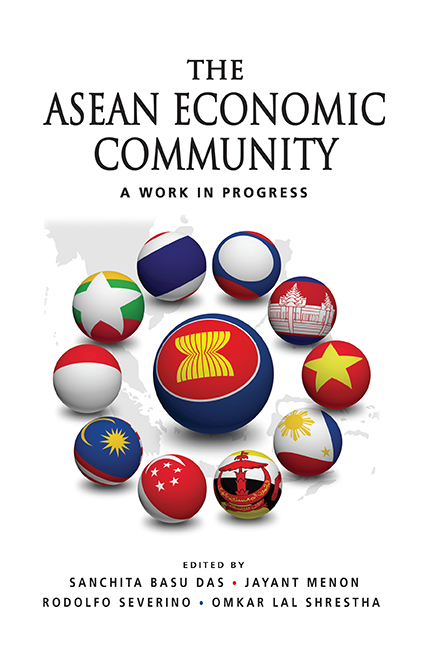Book contents
- Frontmatter
- Contents
- Foreword
- Foreword
- Preface
- acknowledgments
- Abbreviations
- The Contributors
- 1 Overview
- 2 Non-Tariff Barriers: A Challenge to Achieving the ASEAN Economic Community
- 3 ASEAN Trade in Services
- 4 The Asean Economic Community: The Investment Climate
- 5 Competition and Intellectual Property Laws in the ASEAN ‘Single Market’
- 6 Subregional Zones and ASEAN Economic Community
- 7 ASEAN FTAs: State of Play and Outlook for Asean's Regional and Global Integration
- 8 The Asean Dispute Settlement System
- 9 Enhancing the Institutional Framework for AEC Implementation: Designing Institutions that are Effective and Politically Feasible
- 10 ASEAN Economic Community Business Survey
- Index
7 - ASEAN FTAs: State of Play and Outlook for Asean's Regional and Global Integration
Published online by Cambridge University Press: 21 October 2015
- Frontmatter
- Contents
- Foreword
- Foreword
- Preface
- acknowledgments
- Abbreviations
- The Contributors
- 1 Overview
- 2 Non-Tariff Barriers: A Challenge to Achieving the ASEAN Economic Community
- 3 ASEAN Trade in Services
- 4 The Asean Economic Community: The Investment Climate
- 5 Competition and Intellectual Property Laws in the ASEAN ‘Single Market’
- 6 Subregional Zones and ASEAN Economic Community
- 7 ASEAN FTAs: State of Play and Outlook for Asean's Regional and Global Integration
- 8 The Asean Dispute Settlement System
- 9 Enhancing the Institutional Framework for AEC Implementation: Designing Institutions that are Effective and Politically Feasible
- 10 ASEAN Economic Community Business Survey
- Index
Summary
ASEAN free trade area agreements are emblematic of Southeast Asia's shift from non-discriminatory unilateral and multilateral liberalization in the 1980s and 1990s to preferential liberalization over the past decade. But this has not resulted in much external opening or domestic structural reforms. AFTA, ASEAN countries' bilateral FTAs and ASEAN+1 FTAs are “trade-light”, at best fairly strong on tariff elimination, but also weak to very weak in tackling non-tariff barrier and regulatory barriers. The proliferation of Ranks of Origin (ROOs) adds to the Asian noodle bowl. The region's political and economic diversity results in weak FTAs. It also precludes the emergence of strong regional institutions, hard policy coordination and deep integration, while leaving the door open to relatively weak and flexible regional institutions, soft cooperation and shallow integration. These reasons also preclude the emergence of strong region-wide FTAs, e.g., in ASEAN+3 or ASEAN+6. If such FTAs materialize, they will likely be even weaker than ASEAN+1 FTAs. In essence, ASEAN FTAs are too weak to promote intra- ASEAN, wider regional or global economic integration. Grand designs for them would be wishful thinking, and distract attention from what is both feasible and desirable. Rather, they should be improved through modest, incremental reforms that work with the grain of ASEAN and wider Asian realities. But this is a second-order priority to achieve further regional and global economic integration. Rather, the first priority should be to revive unilateral (country-by-country) liberalization of trade and FDI, now extended to next-generation, behind-the-border reforms. That would spark competitive emulation within and beyond ASEAN. That is the key to extending multi-national enterprise supply chains in the region, spreading wider across manufacturing and into services and agriculture, and even opening up regional markets for intra-regional producers and consumers.
Introduction
Free Trade Agreements (FTAs) have been the centrepiece of trade policy in Southeast Asia over the last decade, for individual countries and for ASEAN collectively. In this respect, ASEAN has followed a wider Asian and global trend: trade policy has shifted from non-discriminatory unilateral liberalization, backed up by (non-discriminatory) GATT/WTO commitments, to preferential (i.e., discriminatory) liberalization through FTAs.
- Type
- Chapter
- Information
- The ASEAN Economic CommunityA Work in Progress, pp. 320 - 381Publisher: ISEAS–Yusof Ishak InstitutePrint publication year: 2013



